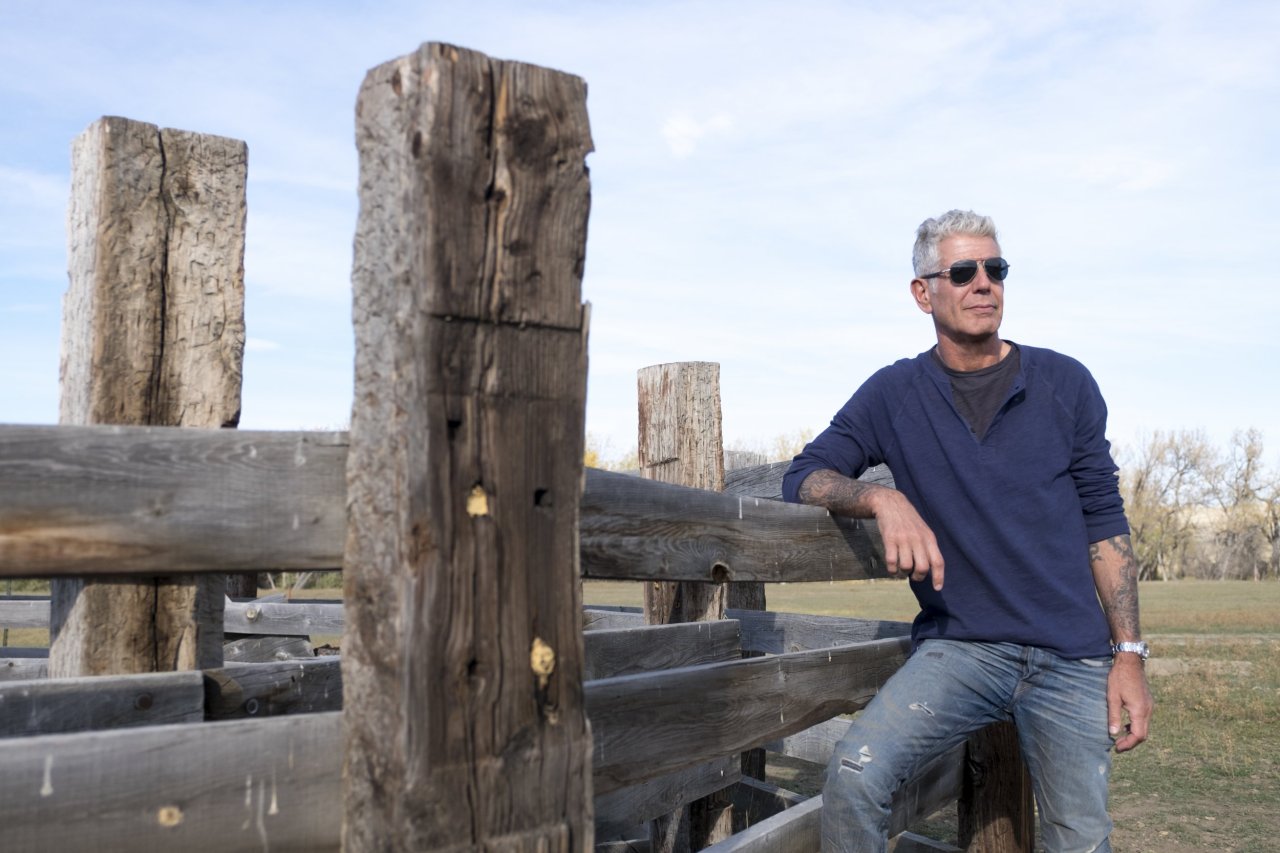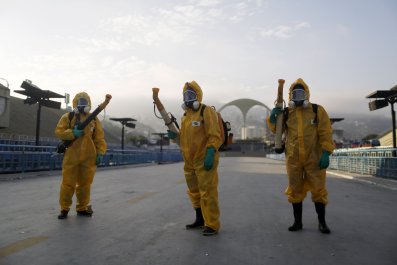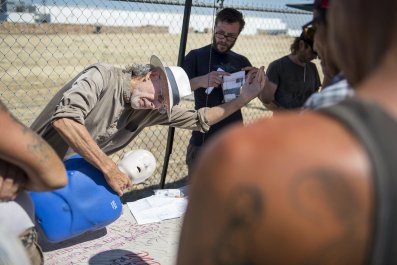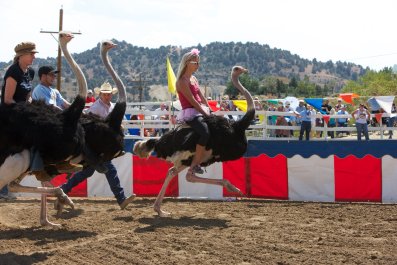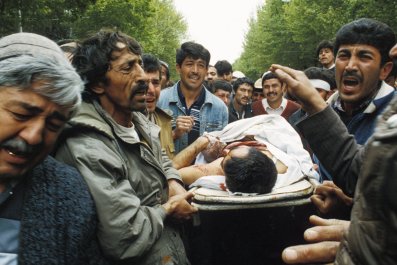It can be cringeworthy to watch Anthony Bourdain chow down on television. Much of what he stuffs down his gullet on CNN's Parts Unknown is either unidentifiable or looks disconcertingly like a living creature. Even the most adventurous eaters among us have, at some point, figured whatever it was probably made him very sick.
The seventh season of Bourdain's hit show returns this weekend, and this time he's making stops to gastronomic destinations that include Cologne, Germany; Buenos Aires, Argentina; and Senegal. Bourdain starts out on Sunday in Manila, the capital of the Philippines, where pig dominates most menus.
Newsweek spoke with Bourdain to find out if the show's lack of foodborne illness is simply a ruse, and what the rest of us mortal travelers do wrong—even those of us with stomachs of steel.
What was the best dish you ate while shooting the new season?
In the Philippines, the sisig was pretty amazing—that's like a sizzling pig face that they serve with a nice runny egg on top and a cold beer. It's great drinking food. It's that perfect sort of mix of lean-fat-lean, chewy, soft. It's got the mixture of flavors and textures that's really magic to pork lovers.
How do you avoid getting sick, or are you editing those parts out of your show?
In my 15 years in traveling around the world, I've missed three days due to stomach problems. I eat what locals eat. I've long found that the person on our crew most likely to get sick is the one who is sort of wary of street food and local food. They always get sick from eating the breakfast buffet at the hotel. That's what brings people down. You eat in crowded local joints, and chances are you're going to be OK.
Where were you traveling in the three days you missed shooting because you were sick? I think in every case it was a tribal situation in Africa, where the food clearly was not wholesome, it was not fresh, they were very poor, they were doing the very best they can. They offered it to me in a communal situation, where everybody is eating out of one bowl with their bare hands, and everyone is looking at you. To be polite, you do what everybody else does, because to do otherwise would be incredibly rude.
I had a pretty good idea that I was spinning the wheel and I was likely to lose. You just gotta take one for the team. The first-order of business when making a show like I do is to be a good guest and to be polite and be grateful for what little people have that they're offering you in good faith.
When you were sitting there and thinking, I'm really going to get sick, was there anything you tried to do to prevent that from happening?
No, you're screwed. When you're eating rotten meat in a situation where 20 or 30 people are all putting their fingers in a bowl and hygiene is not great and people are really poor, you have a pretty good idea of what is coming. Pepto-Bismol ain't gonna help. You're looking at a long course of antibiotics.
Three times in 15 years is a really small price to pay for all the really awesome food that I've had and the kind of relationships I've been able to have with people, largely based on the fact that I don't put my nose in the air. So many of the relationships I have are based entirely on my willingness to try stuff, and if I don't, it's a rejection—it's a rejection of everything the people stand for. It really means something when someone offers you food, and if you're wary of it, you're rejecting them.
Maybe you just have a really good microbiome?
Most of the people on my camera crew and production team have been working with me for close to a decade. The veterans—we all eat. We love nothing more than eating street tacos in Mexico and noodles in Vietnam. It's very, very rare that someone gets sick. When someone does get sick, it's always because in Lahore they just couldn't resist a Caesar salad or cheeseburger or wrap. That's always the fatal error.
Why's that?
Because it's sitting there waiting for the dumb American to come along and order it. The guy selling street tacos under a naked lightbulb in the street—they're serving food to their neighbors. They rely on the repeat business of their neighbors. Poisoning neighbors is not a good business model. Whereas, the Western-style buffet at the hotel, that's a transient audience. The people eating that three-day-old Bolognese sauce, they're going to get on a plane, they're going to be halfway across the Pacific before they get sick. Nobody cares. And the people preparing the spaghetti Bolognese in Jakarta? They have no particular feel for it. They don't like it themselves.
It sounds like your top advice is to avoid the restaurant buffet. What else do you suggest to novice travelers?
Go to busy places. Don't go to places that cater to tourists. Go to places that are packed with locals. Those are the places that make money off of repeat customers rather than transient customers. Don't eat in places that have photographs of the food or the menus are translated into English and the local language. If there's a lot of locals waiting for something, chances are, it's pretty good.
Nothing good will come of eating on a plane. Sleep on the plane and eat when you land. Most people eat on the plane because they're bored. It's better to avoid that. Don't eat in the business-class lounge if you're lucky enough to fly business. Just because it's free doesn't mean it's good!
Do you skip ice cubes in your drinks?
I don't. Some people on my crew do. They're careful about that sort of thing. I'll drink bottled water, I'm not drinking tap water, but I'm not that psycho about it. I'm careful with raw vegetables in places where I see them washing the plate in the river in India and clearly the river is not good water. Then I'll avoid raw vegetables if I can; that's often a vector. If there's no refrigeration in sight and dirt is clearly a problem, the food handling is clearly problematic, then a salad is probably not a good way to go.
Do you go to a doctor on a regular basis?
For inoculations we have a travel medical group we all go to for things like yellow fever. Someone in the office keeps all of us in the crew up on that. I remember my first time I went to the doctor and there was a line of, like, 10 syringes. That was day one of A Cook's Tour 15 years ago—there were a lot of injections.
What about the U.S.? Do you think we're too careful about hygiene in this country?
I think we're way, way overly cautious, and it's been destructive. I think the antibacterial soaps and this insistence on 100 percent certainty that there is freedom from dirt of any kind is ultimately bad for the kind of flora that is our natural resistance—and the science is currently supporting me in this area. It's bad for us. We're designed to eat and absorb and resist a certain amount of dirt and bacteria. Our bodies are good at that, and we should give them a chance to be good at that, instead of insisting that we live in this hermetic bubble free of dirt and also completely free of pleasure. That's just no way to live.



